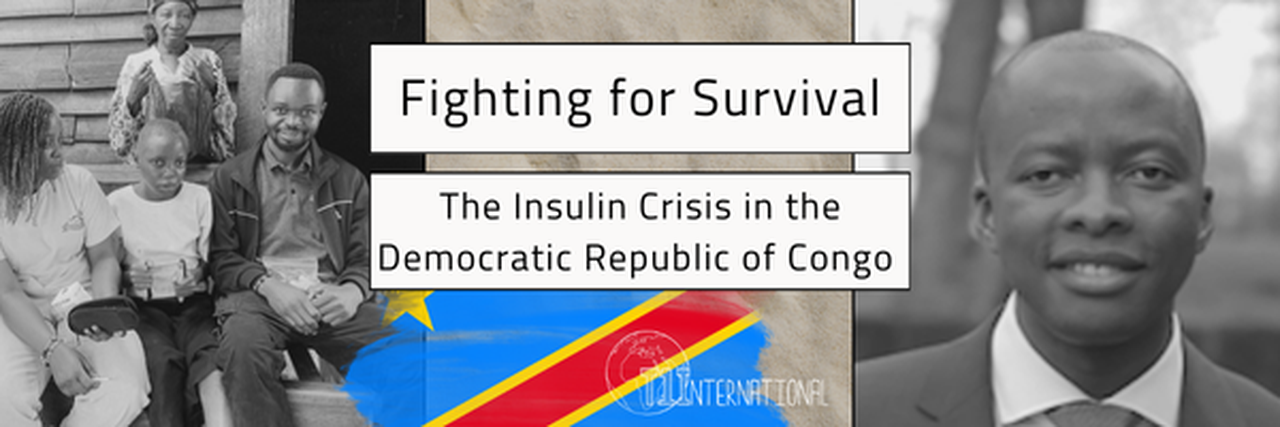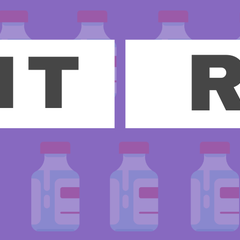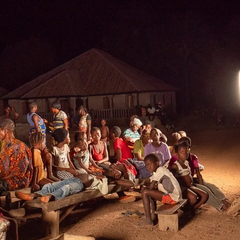
Fighting for Survival: The Insulin Crisis in the Democratic Republic of Congo
23 Sep 2025, 8:02 p.m. in Global Stories by T1International
In the Democratic Republic of Congo (DRC), living with type 1 diabetes is not only a daily challenge–it’s a fight for survival. Access to insulin is deeply unequal and increasingly precarious due to conflict, economic instability, and fragile health systems. Two members of the T1International network, Dr. Kalehezo Murhabazi Albert and Professor Justin Cikomola Cirhuza, share a glimpse into what this crisis looks like on the ground. Dr. Albert is a T1International Global Advocacy Partner who runs the Kivu Diabetes Center in Bukavu and Dr. Justin serves on the T1International Board of Trustees and is a professor of internal medicine, endocrinology and metabolic disease at the Université Catholique de Bukavu, but living in Kinshasa.
A Fragile System Shaken by War
The DRC is vast, with cities separated by thousands of kilometers and often poor infrastructure. Even in the best of times, finding insulin is far from straightforward. Human insulin vials remain the most commonly available form of insulin while analogue pens are quite rare. Since pharmacies seldom stock insulin, patients turn to hospitals where insulin and glucose monitoring supplies are limited and unpredictable. Prices fluctuate dramatically: one vial may cost anywhere between $10 and $20 depending on location according to Professor Cikomola. Considering that the average income in the DRCis only a fraction of this, insulin remains out of reach for many.
For Dr. Albert, based in Bukavu at the Kivu Diabetes Center, the war has made a bad situation catastrophic. When Goma’s airport was destroyed earlier this year, the region’s main supply route for medicines was cut off. Prices surged and stockpiles vanished. “Since the conflict started in February, the region has been isolated, and we no longer know where medicines are coming from,” he explained. By June, he witnessed multiple young people with type 1 diabetes dying from preventable causes: “I personally saw five deaths due to insulin shortages. I do not know how many others have died.”
On the Frontlines of Care
Professor Cikomola, who is working in both Bukavu and Kinshasa, describes the impossible choices families face. Yet many patients are forced to forgo treatment altogether thus risking severe complications or death. He recalls visiting villages where patients were too frightened to travel into town because of insecurity. “Even if they can find insulin, they cannot always pay for it. And if they can pay, sometimes it is not available,” he said.
Both doctors emphasize the heavy burden on patients. She had started a small business that allowed her to afford her insulin, but when the war disrupted her business and livelihood, she could no longer keep up with the costs. Her story is not unique–it reflects a system where survival depends on fragile income sources and the insulin stock availability.
At the Kivu Diabetes Center, Dr. Albert sees children and young people free of charge, but often they return with complications because the insulin he prescribes is unavailable. “It is painful to prescribe a treatment and then hear the next day that the patient could not find it–not only because it is expensive, but also because it is rare to find at all,” he shared.
The Hidden Costs of Neglect
The crisis in the DRC is not only about medicine but also about knowledge, infrastructure, and inequity. Unlike people living with HIV or tuberculosis, who often receive treatment for free, those with diabetes are left to shoulder all the costs of consultations, tests, and medicines. In South Kivu, mortality is staggering, “40% of people with type 1 diabetes die within five years of diagnosis,” reported Dr. Albert.
Basic tools are also lacking. Some regions do not have a single glucometer for diagnosis. Many patients check their blood sugar only once a month, even when on insulin therapy. Misinformation, reliance on traditional medicine, and the scarcity of trained health care providers compound the crisis. Doctors and nurses trained in diabetes care often leave conflict zones for safer cities, further eroding access in rural areas.
Advocacy, Solidarity, and Hope
Despite overwhelming challenges, both Professor Cikomola and Dr. Albert are relentless in their advocacy. For Prof Cikomola, collaboration is key. He urges NGOs, governments, and the private sector to work together to ensure reliable medicine supply chains, reduce taxes on diabetes medicines, and train healthcare providers. He also warns that education alone is not enough: “For patients with type 1 diabetes, even if you bring them education, they die without medicine.”
Dr. Albert has reached out to local and international media to sound the alarm, calling attention to the lives being lost. He partners with groups who provide donations to ease the burden. “I will never stop repeating it because I have seen it with my own eyes–insulin saves lives. Access to insulin changes lives for the better,” he urges.
Both doctors found solidarity and support through T1International, where they joined the global network of advocates pushing for #insulin4all. For them, it is more than an organization. “Through T1International, I received training in advocacy and met people who inspired me, people who had also witnessed the injustice in unequal access to care,” Dr. Albert reflected. “To me, it felt like I found a family.”
Call to Action
The insulin crisis in the DRC is not simply a medical issue but a matter of justice. No one should die for lack of medicine discovered more than 100 years ago. Yet across the DRC, people are dying preventable deaths every day.
The voices of Prof Cikomola and Dr. Albert remind us that solutions are possible but require urgent global solidarity and collective action. Governments can act by reducing taxes on medicines, international organizations can strengthen supply chains, and donors can ensure insulin and essential tools reach those most in need.
Above all, people with diabetes in the DRC fighting to access affordable medicines and care must no longer be invisible. Dr. Albert affirms, “#insulin4all means access to accurate information, access to insulin itself, and access to the tools to manage diabetes. Insulin saves lives, and we must never forget it.”





